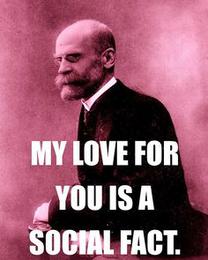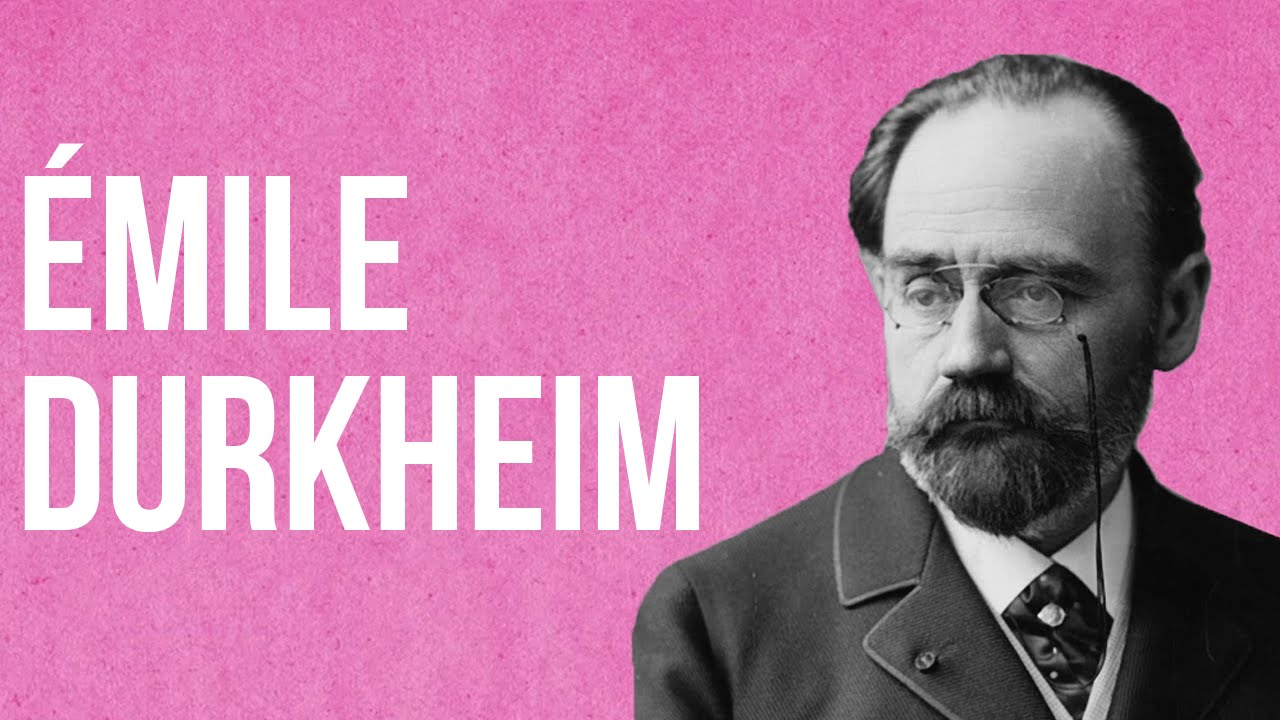I very recently got a hold of a copy of Steven Lukes’ Durkheim from 1973 for a fiver. I had never se riously thought about buying or even reading this book given that, as a French graduate in sociology, you are most likely to have been acquainted with Durkheim’s life and work already. And to be completely honest, you don’t really expect a foreigner to teach you anything new about your local icon…
riously thought about buying or even reading this book given that, as a French graduate in sociology, you are most likely to have been acquainted with Durkheim’s life and work already. And to be completely honest, you don’t really expect a foreigner to teach you anything new about your local icon…
Well, I was wrong. About my assumption first: as Lukes himself acknowledged in the introduction of the 1985 edition, “One noted French scholar assured me at the outset, when I was a fresh young graduate student, that my project was quite beyond the reach of a non-Frenchman” (p. ix). He adds that “In France, in general I found little active interest or encouragement”. I found myself very much in sympathy with this: it is very hard to legitimate your claims to study a foreign author in his/her native country. As a young French graduate myself, I found very little encouragement, and sometimes even patronizing remarks, from British colleagues as I started to study the history of their sociology. It was as if you were not legitimate enough as a Frenchman to study or even understand “their” history.
Of course, there is more to that: it is linked to a long history of national rivalry between the two countries and the fear that, as a young graduate student, you might desecrate a national monument…
Well, that “noted French scholar” was clearly wrong: Lukes’ book is an admirable work of scholarship and proved very useful in importing the French tradition to the UK, where Durkheimianism had always suffered from a severe mistrust.
Apart from the fact that Lukes really knew his stuff and went so far as to provide original English translations of some works that he considered “alarmingly badly translated” from the French, he can be credited for really confronting (pp. 1-36) the criticisms and misunderstandings surrounding Durkheim’s writings in the UK. That’s probably his most useful effort at dispelling the previously bad British receptions of Durkheimianism.
The first British reception of Durkheim (1904-1917)
 To understand it, one must recall Geoffrey Hawthorn’s judgment that “Durkheim's intellectual victory before the [First World] war had been a purely verbal one”. (Hawthorn, 1982, p. 175) By this he drew attention to the fact that the word sociology, which had been coined in France by Auguste Comte in the 1830s, had been largely associated with Durkheimianism before 1914. Durkheim, who had devised his theories between 1893 (with his PhD thesis on La Division du travail social) and 1912 (with Les Formes élémentaires de la vie religieuse), was so popular internationally that he could then brag that sociology was a “French science par excellence” (Durkheim, 1915). France, and sociology, was the latest European craze at the time of the Belle Epoque (1895-1914).
To understand it, one must recall Geoffrey Hawthorn’s judgment that “Durkheim's intellectual victory before the [First World] war had been a purely verbal one”. (Hawthorn, 1982, p. 175) By this he drew attention to the fact that the word sociology, which had been coined in France by Auguste Comte in the 1830s, had been largely associated with Durkheimianism before 1914. Durkheim, who had devised his theories between 1893 (with his PhD thesis on La Division du travail social) and 1912 (with Les Formes élémentaires de la vie religieuse), was so popular internationally that he could then brag that sociology was a “French science par excellence” (Durkheim, 1915). France, and sociology, was the latest European craze at the time of the Belle Epoque (1895-1914).
It makes sense then, given the historic rivalry with France, that the English would not see particularly favourably Durkheim’s hegemonic attempt at defining the new discipline. The first British reception of Durkheim was thus that of a smothering patronage. While the London Sociological Society was precisely founded in 1904 to devise its own ‘British sociology’ away from Spencer’s legacy, Durkheim’s presence (or, rather, shadow because he could not be present and his paper was eventually read by Victor Branford) at its very first meeting was seen as more threatening than helpful. National pride was at stake at a time when France and Britain were really two competing world superpowers in all fields (this including sociology).
The second (posthumous) British reception of Durkheim (1918-1940)
There is a second British reception of Durkheim (following his demise in 1917) in the interwar years when, as the Institute of Sociology was established in 1930 to promote the discipline in Britain, a strong trend of Idealism played against the development of his ideas (see Collini, 1977). To sum up, many British academics were Idealists, i.e. they believed in the power of ideas and of individual psychology (Wikipedia says, “In a sociological sense, idealism emphasizes how human ideas—especially beliefs and values—shape society”) against Durkheim’s emphasis on the reality and power of society over individuals. As a result, his fundamental concept of ‘conscience collective’ (the fact that there exists a collective consciousness or a group mind superior to individuals, stemming from society) became a turn-off for many sociological enthusiasts in Britain.
The third socio-anthropological reception of Durkheim (1940-1973)
There is a third reception of Durkheim which, interestingly, came through British social anthropology. The  most interested academics in his ideas were A.R. Radcliffe-Brown and B. Malinowski in the 1930s with functionalism and later Mary Douglas in the 1960 with her structural/cultural social anthropology. For the anecdote, Steven Lukes’ own PhD supervisor on Durkheim was precisely E.E. Evans-Pritchard, the social anthropologist at Oxford, who he described as ‘a non uncritical admirer of Durkheim’! Which leads to the 1970s with Basil Bernstein’s Class, Codes and Control (1971 and 1973) and Steven Lukes (1973) masterly account of Durkheim which was the first ‘official’ and scholarly-informed piece on the sociologist which dispelled many of the misgivings towards his ideas. A growing interest in French theory emerged in the 1970s with the renewed appreciation of Durkheim and has since continued with Michel Foucault and Pierre Bourdieu in the 1980s.
most interested academics in his ideas were A.R. Radcliffe-Brown and B. Malinowski in the 1930s with functionalism and later Mary Douglas in the 1960 with her structural/cultural social anthropology. For the anecdote, Steven Lukes’ own PhD supervisor on Durkheim was precisely E.E. Evans-Pritchard, the social anthropologist at Oxford, who he described as ‘a non uncritical admirer of Durkheim’! Which leads to the 1970s with Basil Bernstein’s Class, Codes and Control (1971 and 1973) and Steven Lukes (1973) masterly account of Durkheim which was the first ‘official’ and scholarly-informed piece on the sociologist which dispelled many of the misgivings towards his ideas. A growing interest in French theory emerged in the 1970s with the renewed appreciation of Durkheim and has since continued with Michel Foucault and Pierre Bourdieu in the 1980s.
Surprisingly, the different British receptions are historically rather similar to the ones in France. If you would like to know more about the fascinating reception of Durkheimianism in France, Britain and America between 1893 and 1939, you may want to read Francis Pizarro-Noël informative PhD dissertation (in French) at the University of Montréal (2009) on the subject.
The genuine reasons why the British most probably did not like Durkheim…
But finally, using Lukes’ historical and critical study, I would like to specify what, according to me, aroused a British mistrust towards Durkheim.
- The first thing is that, as the back cover rather provokingly states, Durkheim’s theory more or less said that ‘society forms men’s minds and controls their behaviour’. This hypothesis determines Durkheim theory and means that individuals are neither free nor fully responsible for their own acts because ‘it’s society’s fault’. This resonates with Thatcher’s controversial assertion in 1987 (see Wikiquote for the source) that ‘They're casting their problem on society. And, you know, there is no such thing as society. There are individual men and women, and there are families.’ It reflects the French assumption that the State (or Society) is absolutist, as opposed to English liberalism and idealism. Society was a reality for one, an illusion for the other.
- The second is Durkheim’s assertion that ‘Morality is social’ which meant that morality was relative,
 not based on individual psychology (and thus universal as E. Westermarck (1932) had explained) and was thus imposed by Society and not natural (as the Hobbes/Rousseau controversy had showed). According to Durkheim, people were constrained to be moral, they were not it naturally (by the way, do you see the philosophical connection running from Durkheim to Foucault’s Discipline and Punish?). Durkheim’s sociology was based on the French philosophical assumption on society and opposed the Victorian, ethical ideal prevailing in the UK.
not based on individual psychology (and thus universal as E. Westermarck (1932) had explained) and was thus imposed by Society and not natural (as the Hobbes/Rousseau controversy had showed). According to Durkheim, people were constrained to be moral, they were not it naturally (by the way, do you see the philosophical connection running from Durkheim to Foucault’s Discipline and Punish?). Durkheim’s sociology was based on the French philosophical assumption on society and opposed the Victorian, ethical ideal prevailing in the UK.
- “When told that the facts contradicted his theories, [Durkheim] used to reply: ‘the facts are wrong’.” (Lukes, 1973, p. 33) Durkheim also embodied the stereotype about the French rationalist/intellectualist bias. As such, he exemplified the Cartesian belief that theory was preceding over facts. It appears that this opposed the English empiricist tradition in philosophy following, especially, Locke. Durkheimianism was equated to an ideology and a blindness to reality.
As a result, Durkheim epitomised the contradictions between the French and British traditions – and was therefore subject to a conscious and voluntary ignorance, if not opposition, in the UK, until Lukes’ illuminating essay in 1973.
Now, to be fair, it would be necessary to study the French reception of British sociology and see whether the contradiction was also felt the other way around and subject to a conscious ignorance from French sociologists, or whether British sociology was fully accepted and understood in France... There is much to say about this, but that will be the topic of a later post!
